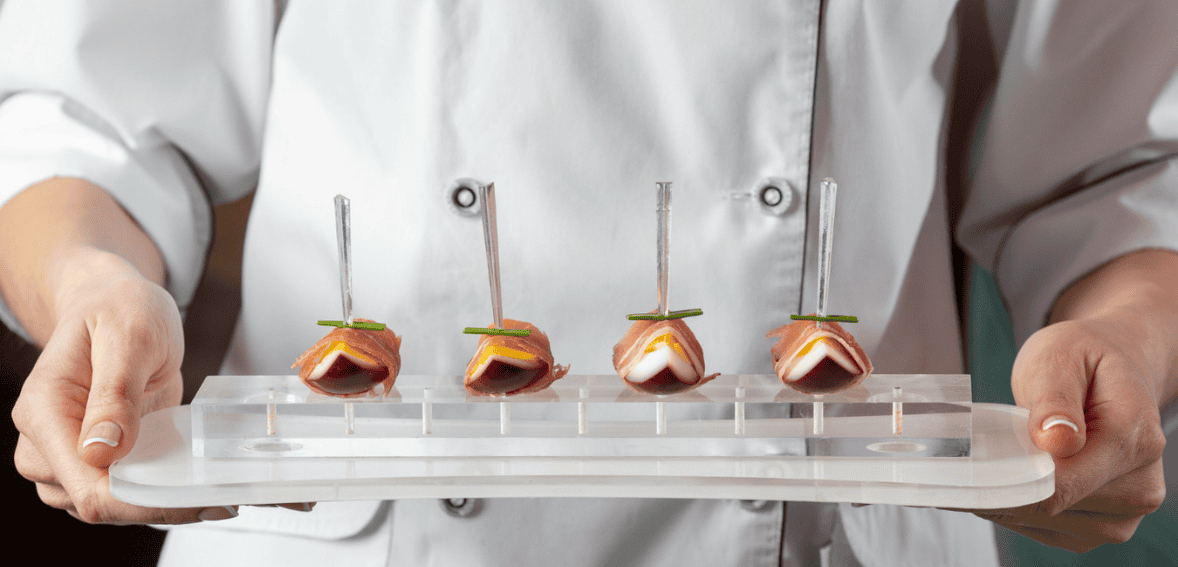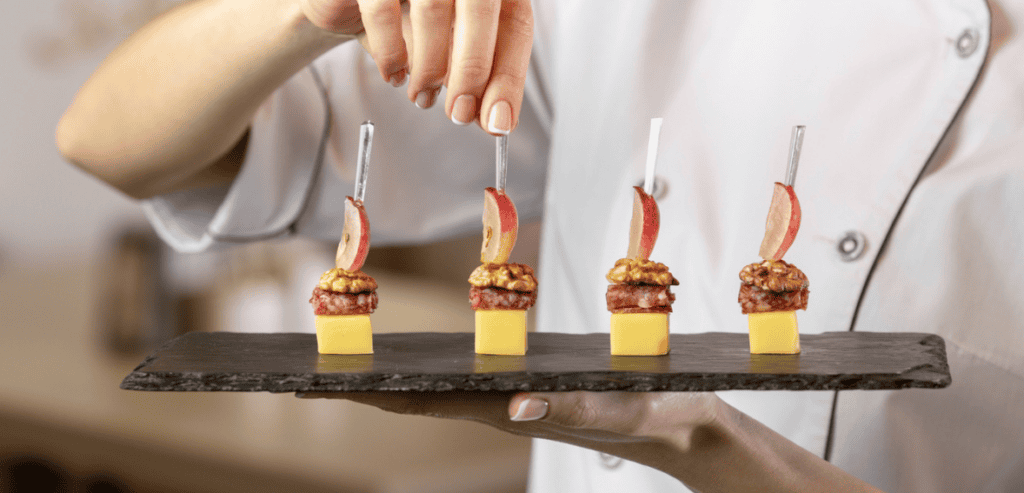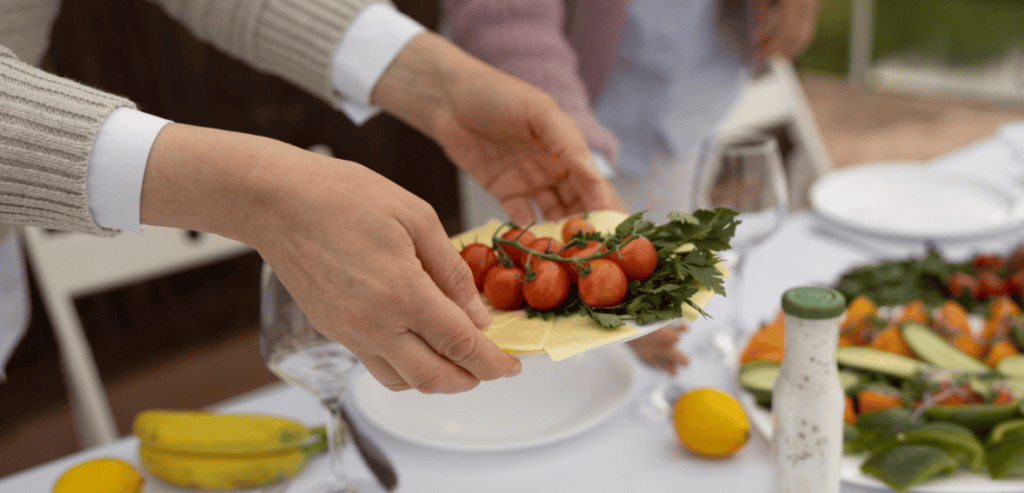
By Jermaine Thomas October 21, 2025
When it comes to an event, the food is always the most memorable part for your guests. Whether it’s a wedding or corporate function, the menu quality and presentation can make or break the whole experience. But many hosts struggle with how to make the right decision before they book a caterer. That’s where catering tastings come in; an essential part of event planning that helps you decide if the caterer fits your vision, taste and service expectations.
A tasting is not just about tasting dishes; it’s a deeper assessment of professionalism, communication and the caterer’s ability to adapt to your event theme and requirements. It gives you the confidence that the team you choose can deliver on the day. Knowing what happens during these sessions, what to look for and how to use them to finalise your event food choice can make the process enjoyable rather than stressful.
The Purpose of a Catering Tasting Session
The main purpose of a catering tasting is to ensure that what you envision for your event translates perfectly onto the plate. While a menu may look appealing on paper, the actual flavors, textures, and presentation can vary widely. A tasting allows you to experience the dishes firsthand and see how well the caterer executes your chosen cuisine. For large or formal events, this session is crucial in determining whether the caterer meets your standards for quality and consistency.
It’s also your opportunity to evaluate how the team interacts with clients. Are they attentive to feedback? Do they note your preferences and dietary restrictions? The ability of a caterer to adjust based on your input is as important as the food itself. This session helps establish a foundation of trust and transparency before you hire a caterer, ensuring both parties are aligned in expectations.
How to Prepare for Your Tasting Appointment
Before attending your catering tasting, take the time to plan and clarify your expectations. Review your event theme, guest count, and dietary requirements so that your caterer can curate a representative menu. Make sure to communicate specific requests ahead of time; for example, if your event includes vegan or gluten-free guests, the tasting should reflect those needs.
Bring a notepad or use your phone to record impressions of each dish, including notes on seasoning, presentation, and portion size. This will help you make an informed event food selection afterward. Remember that the goal isn’t to be overly critical but to ensure each dish aligns with your event’s tone and your guests’ preferences. Preparation also includes an open mind; be willing to try new flavor profiles or creative ideas your caterer suggests. Their expertise might elevate your vision beyond what you initially imagined.
Evaluating Presentation and Quality
Visual appeal plays a huge role in food enjoyment. During the catering tasting, pay attention to how dishes are plated and garnished. Presentation provides insight into how the caterer values aesthetics and detail; both crucial for events like weddings, galas, or product launches where food doubles as décor. The style should complement your event’s mood: sleek and minimal for corporate gatherings, colorful and vibrant for festive celebrations.
However, presentation should never outweigh quality. Taste each dish carefully, noting freshness, balance of flavors, and ingredient quality. Poor seasoning or heavy sauces can signal inexperience or lack of attention. A skilled caterer will balance flavor and presentation harmoniously. This stage gives you a chance to provide feedback and request modifications, ensuring that the final menu aligns with your desired dining experience before you hire a caterer officially.
Understanding Portion Sizes and Service Style
At a tasting, pay attention to portion sizes; often overlooked but super important. You don’t want to leave your guests hungry or overwhelmed. The tasting will give you insight into how the caterer balances presentation with quantity so each dish is satisfying and elegant. For buffets or family style service, portion awareness will help you avoid waste and abundance.
Discuss service options during this session too. Do you want plated meals, interactive food stations or passed hors d’oeuvres? Each service style affects the pacing and guest experience. Ask your caterer how they will manage flow, refills and staffing for your event. A good team will explain how they handle different service styles efficiently. This will give you peace of mind that your food selection supports both the culinary and logistical aspects of your event.
Comparing Multiple Caterers for the Best Fit
It’s often wise to schedule tastings with more than one caterer, especially for significant events. Comparing experiences helps you understand the range of service and pricing available in your area. You might find that one excels in creative presentation while another shines in flavor or professionalism. A side-by-side comparison ensures your final decision is based on merit rather than convenience.
Keep your event’s priorities in mind when you hire a caterer. If your guests value unique experiences, prioritize innovation. If dietary inclusivity is key, focus on adaptability. Some caterers also offer flexible pricing structures depending on seasonal ingredients or menu size. Weigh these factors carefully, as the right fit will combine great food, clear communication, and reliability. Ultimately, a catering partnership should feel collaborative and inspiring, not transactional.
Questions to Ask During the Tasting
A tasting session is the perfect opportunity to gather detailed information before making your final choice. Ask questions about ingredient sourcing, food safety practices, and how the team handles last-minute changes. These inquiries demonstrate professionalism and ensure accountability. For example, you might ask whether the caterer uses local produce or sustainable ingredients, or how they handle delays in service.
Additionally, discuss logistics such as setup time, staffing requirements, and backup plans for outdoor or weather-sensitive events. A well-prepared caterer will have clear answers and contingency strategies. The more questions you ask during the catering tasting, the fewer surprises you’ll face later. These discussions also reveal how responsive and transparent the caterer is, qualities that matter as much as culinary skill.

Aligning the Menu with Event Theme and Guests
Every event tells a story and the menu should tell it too. Whether you’re having a beachside wedding, black tie dinner or a casual company picnic, the food should match the vibe. At the catering tasting, see if the caterer gets the atmosphere you want. Are they offering options your guests will love? Do they understand cultural or seasonal nuances that will add to the experience?
For mixed guest lists, variety is key. A mix of light and heavy options, traditional and modern dishes means everyone will find something they like. The best caterers will design menus that balance familiarity with creativity so your event food is memorable. If the team is flexible and excited to customize dishes, it’s a good sign they care about your success.
Pricing Transparency and Value Assessment
Budget discussions can be uncomfortable, but they are necessary before you hire a caterer. A catering tasting provides a practical way to evaluate whether the quality justifies the cost. Some caterers include tastings as part of their package, while others charge a small fee that’s later credited toward the booking. Review pricing structures carefully, ensuring you understand what’s included; from linens and staff to cleanup and rentals.
Assess value beyond taste alone. Consider reliability, experience, and the professionalism of communication. A slightly higher price may be worthwhile if it guarantees seamless execution and peace of mind. Remember, catering is an investment in your event’s reputation. The team you choose should deliver not just great food but also confidence that everything will run smoothly on the day.
Common Mistakes to Avoid During Tastings
Most clients show up to tastings without a plan and end up overwhelmed. One of the biggest mistakes is not taking detailed notes; assuming the caterer knows your preferences without writing them down. Another is focusing on favorite dishes rather than how the whole menu flows together. The tasting should simulate a real dining experience so consider pacing, balance and contrast between courses.
Don’t make decisions based on price or presentation. A beautiful dish may not appeal to your audience’s palate. An affordable quote may hide poor service. Stay objective and prioritize overall fit. Take pictures and detailed notes during your tasting so you can refer back to them later when you’re finalizing your event food.
Post-Tasting Evaluation and Final Decision
Once your tasting is complete, take a day or two to reflect. Revisit your notes and consider feedback from any co-planners or guests who attended the tasting with you. The right choice should feel confident and natural. Compare each caterer not just on food quality but also on communication, flexibility, and reliability.
When you’re ready to hire a caterer, review the contract carefully. Confirm menu details, staff count, delivery schedules, and payment terms. Ensure that all verbal agreements during the tasting are documented. A professional caterer will outline clear terms, avoiding hidden costs or last-minute surprises. Signing the agreement should mark the beginning of a smooth collaboration that brings your event vision to life.
The Value of Communication After the Tasting
After selecting your caterer, maintain open communication. Share updates about your guest count, timeline, and venue layout to help the team prepare accurately. Consistent dialogue ensures there are no misunderstandings as the event approaches. Even after the catering tasting, continued feedback allows the caterer to fine-tune details, ensuring everything aligns perfectly on the day.
Regular updates also strengthen trust and create accountability. Professional caterers appreciate clients who engage actively in planning, as it allows both sides to anticipate challenges early. This ongoing collaboration reinforces why tastings are not just a one-time meeting but the beginning of a working relationship built on transparency, respect, and shared goals.

Why Tastings Are Worth Every Penny
Some event planners view tastings as optional or unnecessary expenses, but they’re an invaluable investment. A catering tasting saves you from potential disappointment by providing firsthand experience of flavor, service, and professionalism. It helps you avoid unpleasant surprises like underseasoned dishes or poor coordination on the event day. Beyond taste, it’s about assurance; knowing that your chosen caterer can execute your vision reliably.
The insights gained during tastings often lead to refined menu decisions that enhance guest satisfaction. Whether it’s adjusting spice levels or fine-tuning dessert options, small tweaks can make a big difference. Ultimately, the value of tasting lies in confidence. It transforms uncertainty into excitement, ensuring that when you hire a caterer, you’re not just hoping for excellence; you’ve already tasted it.
Virtual and Off-Site Tasting Options
In recent years caterers have adapted to modern demands and now offer virtual or off-site tastings. These are especially useful for destination events or corporate planners managing large teams remotely. A virtual tasting involves pre-delivered sample boxes where clients receive curated dishes to taste simultaneously over video calls. This allows for discussion of flavours, textures and presentation even when distance is a factor.
Off-site tastings give you the opportunity to see how the caterer adapts to different environments. If your event is outdoors or in a non-traditional venue these sessions show how well the team handles temperature control or plating logistics. While nothing beats in-person interaction, these flexible formats allow clients to experience quality and service without travel constraints. For busy hosts or multi-location companies, virtual tastings mean every decision maker has a voice before you hire a caterer, keeping everyone included and convenient throughout the planning process.
Coordinating with Event Planners and Venues
A catering tasting session becomes even more productive when aligned with event planners and venue coordinators. Collaboration ensures that food decisions integrate smoothly with logistics such as space layout, power access, and serving timelines. When your caterer understands the venue’s kitchen capacity and floor plan, they can tailor menu execution accordingly. Planners, too, can provide valuable insights about guest preferences and flow, helping refine your event food selection into a cohesive experience.
Including all stakeholders in the tasting creates synergy between design, timing, and service. For example, planners might coordinate tasting samples that reflect the décor palette or seasonal theme, ensuring food presentation complements other event details. It also helps identify potential challenges early; like limited prep areas or guest movement patterns; that could impact catering performance. This collaborative approach transforms a tasting from a culinary trial into a full-fledged planning milestone. When planners, venues, and caterers communicate openly, it guarantees that what’s decided in the tasting translates flawlessly to the live event.
Gathering Feedback from Co-Hosts and Guests
When planning weddings or corporate galas, decision-making rarely happens in isolation. Bringing co-hosts, family members, or trusted colleagues to your catering tasting adds multiple perspectives to the process. Each person might notice different aspects; one focusing on presentation, another on flavor balance, or portion size. This collective input helps ensure that the event food selection appeals to a broader range of guests, not just individual preferences.
However, feedback should be structured. Encourage your group to take notes quietly during the tasting and discuss impressions afterward. Too many conflicting opinions mid-session can overwhelm the caterer and derail focus. Once you consolidate everyone’s thoughts, present them clearly to the catering team so they can make adjustments efficiently. This process ensures your final decisions are balanced, well-considered, and guest-centric. Ultimately, involving others strengthens your confidence in the choice you make when you hire a caterer, knowing it reflects a shared standard of excellence that resonates with the event’s audience.
How Tasting Trends Reflect Modern Event Dining
The evolution of catering tasting sessions mirrors broader trends in modern dining. Today’s clients expect creativity, sustainability, and personalization, and tastings are where these values come alive. Many caterers now highlight locally sourced ingredients, plant-based menus, and zero-waste practices, demonstrating commitment to eco-conscious dining. These sessions often showcase innovative plating and fusion flavors that align with current culinary movements, giving clients a sense of how forward-thinking their caterer is.
Beyond food, presentation has become more experiential. Caterers use tastings to demonstrate live cooking setups or signature stations, helping clients visualize interactive elements for guests. This shift from static plates to immersive food experiences represents a new era in event dining. For planners looking to impress guests, paying attention to these trends during the tasting helps ensure the chosen caterer aligns with contemporary expectations. It’s not just about confirming taste; it’s about ensuring your event food selection feels current, dynamic, and unforgettable in execution and flavor.
Conclusion
Selecting the right caterer can define your event’s success. A thoughtful catering tasting bridges the gap between expectation and execution, giving you a tangible sense of what your guests will experience. From menu customization to service quality, each tasting provides critical insights that help you make informed decisions about your event food selection. When you take the time to prepare, evaluate carefully, and communicate clearly, you set your event up for success. The process may seem detailed, but the peace of mind it offers is invaluable. Choosing to hire a caterer who meets your standards after a comprehensive tasting ensures that the flavors, presentation, and professionalism of your event remain unforgettable.